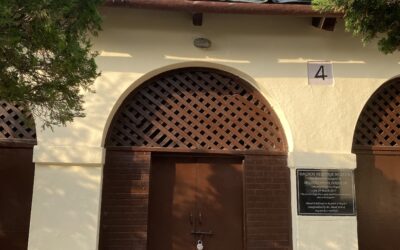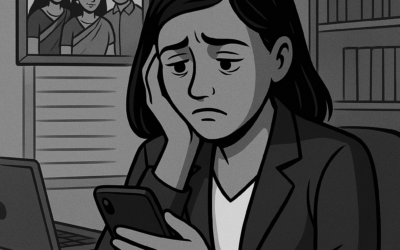When was the last time you felt most liberated? This question that was thrown at us during a virtual learning session has stayed with me for days. At first, it seemed simple enough. But after spending some time pondering on it, I know the guise of simplicity is only a deception.
On one full moon night, we went for a walk just outside the Swasthya Swaraj clinic in Kerpai, Kalahandi at around 9.30 pm (which, for context, is the equivalent of 11.30 pm in cities). It was just one of my female friends and I, wrapped in blankets as it was extremely cold. We walked for hours up and down the road, talking about random things, pausing in between to find out if we could identify any of the constellations. At one point, we sat down in the middle of the road to take a proper look at the beautiful sky.



In another instance, on the eve of International Women’s Day, when the moon was still waxing crescent, three of us walked down from the Silet (name of a place) clinic to a riverside, armed with one solar-charged light, one string of fairy lights and a bucket full of bathing essentials. Slowly, in our own time, we unwrapped ourselves and entered the river, half naked.
It took some time for the body to accept the temperature of the water. But once we took a few dips on the count of three, we were well adjusted to the cold. All of us were floating in the river looking at the vast, starlit sky above; our arms wide open to embrace it all.
Going back to the question, I think this is when I’ve felt most liberated. If not for Kalahandi, I would have never had the luxury to wander on roads at midnight under the stars with no street lights/torch light, just a few girls around. I could have never imagined bathing in the open, almost naked with just the light of a solar bulb.
On those nights, I have not turned on my flashlight frequently to check if I was being followed by someone. There was no need to fasten my steps. Rather, I was taking a relaxed and leisurely walk. There was all the time to slow down and notice the beauty of darkness around me; how each tree reflected the moonlight, follow a firefly, see the distant light in a village, and watch the scary shadows of various things around.
On our bathing nights, we would open our arms and stretch our legs to form some kind of a triangle. We would sing our hearts out, pause, gasp at the beauty the night was. Don’t mistake me, I could do all this not because there was no one around. Every once in a while, the drunk men from Kerpai/Kachilekha and other nearby villages would cross us in their cycles, minding their own business. They never assumed our presence on a public road at night was an open invitation to harass us.

I think I felt the most liberated when I felt the most safe.
It isn’t uncommon that I have fear of unknown men in public spaces. Along with the stories I’ve heard from friends, I myself have had scores of bad experiences around strange men in urban areas. Every woman has a story. It doesn’t matter how extreme, every woman has felt unsafe at one point in their life because of a man. I can think of numerous times when I’ve felt extremely afraid or uncomfortable because of a certain situation where a man made me feel unsafe in public.
It is common for women to spend a lot of time (consciously or not) planning for their own safety. A quick chat with any of my friends will reveal many tactics we regularly deploy – pulling up our dupatta, being on the phone or pretending to be on the phone with someone, not listening to music, crossing the street if someone is behind us, not taking shortcuts on routes that will be unlit, sending our location details to multiple people and so on.
In the last couple of years, through a lot of reading, I have come to realize the psychological impact this pervasive fear has on me. It was always confusing as to why my body became so tense or why I felt so unnecessarily anxious in public places. This is what I have understood. In terms of how our brain reacts to this low-level persistent feeling of “unsafety”, there seems to be almost no difference between reactions to fearful situations and reactions to perceived fearful situations.
The brain will react in a similar way whether we are feeling unsafe while jogging or actually running away from an attacker. In either of these situations, our body will prepare itself to either flee or fight. In order to do this, our levels of cortisol and adrenaline will increase, giving us the energy to run away from an attacker or defend ourselves. However, if we don’t have to do either of these things, we are simply left with higher levels of these stress hormones in the body, nowhere to dump them.
Having consistently higher levels of cortisol and adrenaline in the body are linked to higher levels of anxiety, meaning that it can turn into a never-ending cycle of feeling unsafe. This article explains how does anxiety affect the brain.
In the last 5 months in Kalahandi, I don’t remember feeling unsafe or uncomfortable. No one whistled at me in the street or catcalled while in public spaces. The only exceptions were two incidents, and the commonality between the two was the fact that the harasser was from the so-called ‘civilised/modern’ city.
My body has slowly started to calm down. There is relatively less pre-planning for my safety and rehearsing my attack moves (in my mind, of course). And honestly, I feel so much more at peace. I wish to continue living with this mind space as it is such a big personal achievement.

I am grateful to Kalahandi for bringing back some of my trust in strangers—to not get paranoid when a man walks behind me casually, to believe in the innocence of a stranger’s smile and not question whether it is laden with an indirect sexual favour. I’m grateful to Kalahandi because today I can say: When I am in the villages, is when I have felt the most safe.
I know it’s not all men, but it is every woman. And I wish that every woman gets to experience this feeling of safety!




Your best piece so far! ❤️
Your best piece so far! ❤️